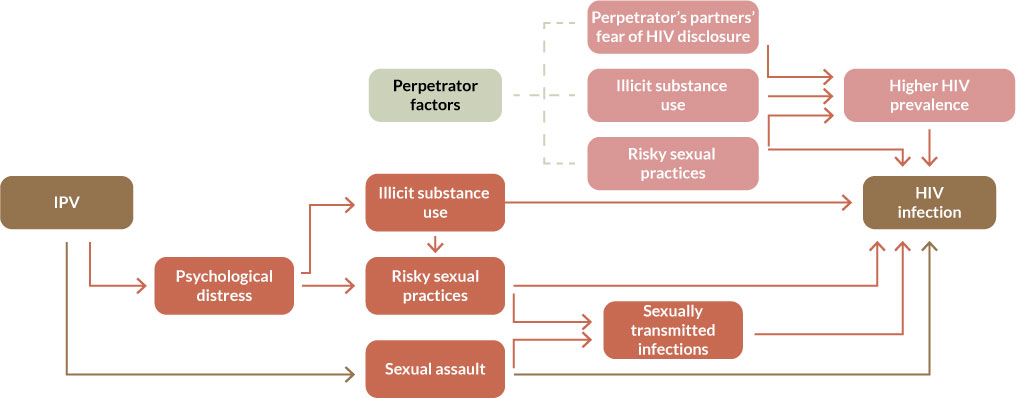Addressing intimate partner violence at HIV clinics
Reed Siemieniuk, of McMaster University, described research done at the Southern Alberta HIV Clinic investigating links between intimate partner violence (IPV) and HIV, depicted in the flowchart below.

Click here for an alternate text description of the flowchart above.
Siemieniuk explained that domestic violence can include sexual, emotional, and financial abuse as well as physical abuse. One third of clinic patients surveyed had experienced abuse either as adults or children, and other studies have suggested that between 20-50% of people living with HIV will experience abuse at some point in their lives. Women of all races and Indigenous men are disproportionately likely to experience abuse.
Data from clinic patients has revealed complex cycles of abuse that go through periods of being more and less severe. Prospective and cross-sectional studies from other researchers have also shown that intimate partner violence can increase the risk of HIV by up to 50%.
In terms of physical health, women who have experienced intimate partner violence are:
- 5 times less likely to have secure housing
- 8 times more likely to have been incarcerated
- 6 times more likely to use drugs
- 1 times more likely to smoke tobacco.
Gay and bisexual men who have experienced intimate partner violence are:
- 6 times less likely to have secure housing
- 6 times more likely to have been incarcerated
- 5 times more likely to use drugs
- 5 times more likely to smoke tobacco.
In terms of mental health, women who have experienced intimate partner violence are:
- 5 times more likely to be depressed
- 8 times more likely to experience anxiety
- 8 times more likely to attempt suicide.
Gay and bisexual men who have experienced intimate partner violence are:
- 9 times more likely to be depressed
- 8 times more likely to experience anxiety
- 5 times more likely to attempt suicide.
Women and men living with HIV who experience IPV also report worse health-related quality of life, experience longer gaps in their HIV care, and report more HIV-associated hospitalizations.
Siemieniuk stressed that clinic patients appreciate being asked about IPV and urged clinicians not to pass responsibility for addressing this issue on to somebody else. He recommended that clinics introduce IPV screening into their process plans so that they know how to respond when violence is disclosed.
